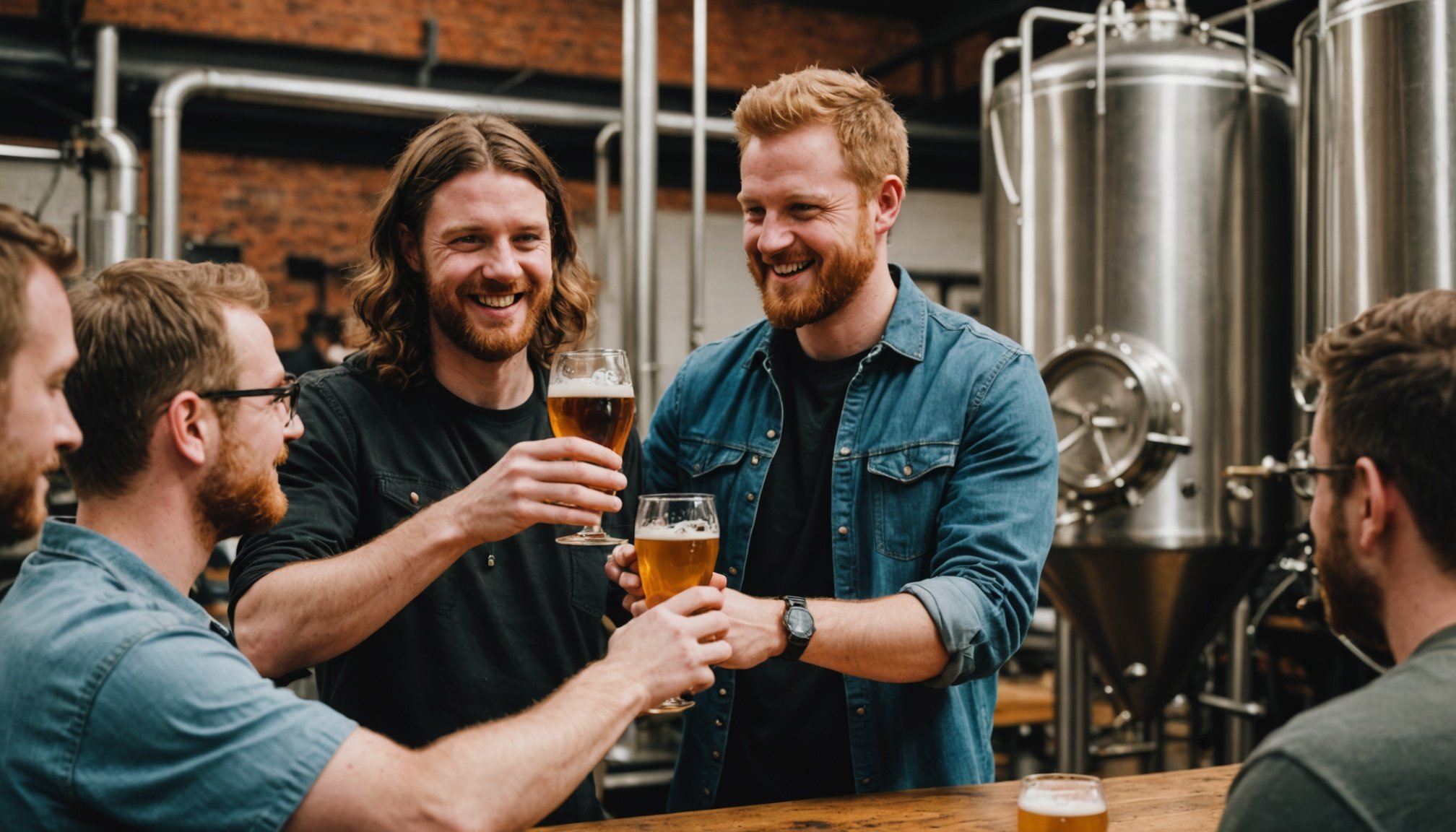Importance of Community Connection for Breweries
The importance of community engagement for breweries can’t be overstated. Breweries often serve as vibrant hubs that build connections within their communities. These local breweries thrive when they are attuned to their neighbourhood’s needs and preferences. Integrating community-focused initiatives has been proven to significantly contribute to brewery success.
Social media plays a pivotal role in this dynamic. The impact of social media allows breweries to foster connections in real-time, broadening their reach beyond physical locations. This digital engagement encourages patrons to participate in events and share their experiences, effectively acting as ambassadors for the brand. Positive interactions on platforms like Instagram and Facebook are instrumental in drawing both local and visiting crowds, enhancing the brewery’s reputation and visibility.
Also to discover : Illuminate your store: lighting solutions that enhance sales
Moreover, implementing successful community engagement strategies is crucial. These strategies may include hosting local events, partnering with nearby businesses, supporting local causes, and crafting unique experiences that resonate with the community. Such initiatives not only cultivate loyalty among local patrons but also attract tourists looking for authentic, community-rooted experiences. By strategically leveraging social media impact, breweries can sustain and elevate their community ties, ultimately securing their position as integral components of their local ecosystems. This symbiotic relationship between breweries and their communities underscores the essential role of community engagement in ensuring long-term brewery success.
Key Social Media Platforms for Breweries
Social media marketing has become indispensable for breweries aiming to foster connections with their audience. Different social media platforms offer unique opportunities for engaging with craft beer enthusiasts. Here’s how breweries can leverage these platforms effectively.
In the same genre : Decoding london fashion: harnessing data analytics for trend forecasting in the city’s style landscape
Facebook remains a cornerstone for brewery marketing due to its diverse engagement tools. Creating engaging posts is a must; breweries can share behind-the-scenes content, user-generated photos, and spotlight new releases to captivate their audience. Utilizing events and groups is another avenue for breweries. By hosting virtual and in-person events through Facebook, such as tasting sessions or Q&A with brewers, breweries can boost community connection and interaction. Success stories abound, as local breweries have notably expanded their reach and seen increased foot traffic by forming and nurturing dedicated Facebook groups.
For visual storytelling, Instagram is unparalleled. Breweries can use this platform to enhance their brand by sharing vibrant photos of their brews, creating a visually appealing narrative. Hashtags and geographic tagging allow users to discover breweries based on interests or location, amplifying reach. Engaging with followers through stories and reels offers realtime interaction and showcases the personality behind the brand, making followers feel involved and valued.
Twitter is the go-to for real-time interaction. Breweries can quickly share updates, promotions, and engage in direct conversations with community members. This platform thrives on hashtags and trending topics, which are pivotal for visibility and engaging with the larger beer enthusiast community. Through skillful use of hashtags, breweries can participate in broader conversations or start their own, increasing brand awareness.
Best Practices for Social Media Engagement
To build a thriving online community, it is crucial to understand social media best practices. One of the foundational elements involves creating content that is both relatable and impactful. This means crafting messages that resonate with your audience’s values and aspirations. Knowledgeable users are increasingly drawn to authentic stories that reflect their experiences, making it essential for brands to connect with their audience on a genuine level.
Consistency and timing in posting play a pivotal role in enhancing community building. Regular updates keep your online presence vibrant and maintain audience interest. Identify peak engagement times specific to your audience and schedule posts accordingly to maximize reach and interaction.
Encouraging user-generated content and feedback fosters a sense of belonging among users. When followers are invited to contribute their perspectives or share their stories, they feel valued and more invested in the community. This not only increases engagement but also generates diverse content reflective of the audience itself.
By integrating these strategies—relatable content, consistent posting, and encouraging feedback—into your social media activities, you’ll create an engaging environment that nurtures loyalty and growth within your community. Engaging effectively within social media not only strengthens your online presence but also solidifies trust and commitment among your followers.
Case Studies of Successful Campaigns
In this section, we delve into two remarkable case studies highlighting innovative and successful campaigns conducted by breweries, shedding light on the strategies and outcomes achieved.
Glasgow Brewery Campaign 1
The primary objective of this campaign was to enhance brand awareness among local consumers. The brewery examples showed a strategic approach by utilising social media and community events to engage directly with their audience. By creating a series of interactive posts and hosting tasting sessions, they made their campaign not only informative but also engaging. The results were impressive, as the brewery noted a significant increase in social media followers, alongside positive feedback from the community. This engagement led to a vibrant conversation around their products and strengthened customer loyalty by reinforcing the brewery as a local community pillar.
Glasgow Brewery Campaign 2
This campaign focused on attracting a younger audience while promoting a new product line. Utilising digital marketing tools like targeted ads and influencer partnerships, the brewery tapped into a broader demographic. They crafted appealing content and leveraged social media platforms, aiming to create lively discourse among their target audience. The impact was substantial; the buzz generated resulted in increased sales and brand recognition. These takeaways highlight that understanding the audience and employing modern tools is crucial for the success of future campaigns. Such initiatives demonstrate the potential of well-crafted strategies in cultivating a positive reception and achieving brand growth.
Challenges in Social Media Engagement
Engaging effectively on social media presents several engagement challenges for breweries. Among the most common barriers are identifying the right audience, maintaining consistent interaction, and ensuring content relevancy. Another hurdle is managing negative feedback, which demands tact and a balance between maintaining brand integrity and satisfying consumer concerns.
To tackle these challenges, problem-solving strategies become essential. Breweries should focus on understanding their community, which involves gathering insights into user preferences and adjusting content accordingly. Creating tailored and relatable content can significantly enhance the community connection. Additionally, incorporating engaging visuals and interactive elements, like polls and live sessions, can increase participation.
A significant element to successfully overcoming these hurdles is the importance of adaptability and responsiveness. In the ever-evolving landscape of social media, breweries must be vigilant about emerging trends and consumer preferences. Rapid response to comments and queries not only boosts engagement but also fortifies trust and loyalty among the audience.
By employing these problem-solving techniques and fostering a meaningful community connection, breweries can navigate social media challenges more effectively. This approach not only resolves engagement issues but also strengthens their overall social media presence, encouraging a more vibrant and interactive online community.
Supplementary Resources and Tools
Navigating the myriad resources available to breweries can enhance both daily operations and long-term strategic planning. For starters, there are a variety of recommended tools for analytics that can serve breweries in gaining insights into consumer behaviour and improving product quality. Platforms like Brewstat can provide actionable data and trends that breweries can leverage to stay competitive.
In addition to analytics, effective scheduling tools are invaluable. Applications like Tock can aid in resource allocation, ensuring that brewing and distribution processes run smoothly and efficiently. These tools can substantially save time and reduce operational hiccups.
Creating engaging visuals and graphics is another area where breweries can stand out. Simple design tools, such as Canva, facilitate the creation of compelling marketing materials like posters, banners, and social media posts without needing professional design skills. The impact of high-quality visuals on consumer engagement cannot be overstressed, often leading to better brand recognition and loyalty.
Furthermore, continuous learning through additional resources is vital for sustaining growth. Websites like the Brewers Association offer extensive libraries of articles and webinars designed for enhancing engagement and professional development. By continually upgrading skills and knowledge, breweries can adapt to changing market trends and maintain relevance.











